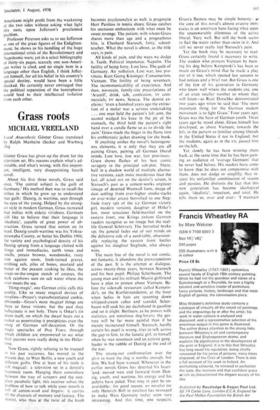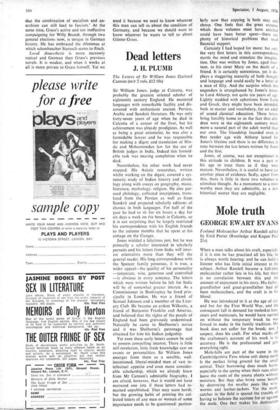Grass roots
MICHAEL VREELAND
Local Anaesthetic Gunter Grass translated by Ralph Manheim (Seeker and Warburg 35s)
Gunter Grass has given up the drum for the television set. His reasons explain what's ad- mirable, and what's wrong, with this import- ant, intelligent, very disappointing fourth novel.
About his first three novels, Grass said once, 'The central subject is the guilt of Germany.' His method then was to recall the milieu in which he grew up to understand that guilt: Danzig, in wartime, seen through the eyes of the young. Helped by the strong- est style in modern German, Grass recreated that milieu with eidetic vividness. Germans still like to believe that their language is Idealistic', capable of great power of ab- straction. Grass turned that notion on its head. Danzig-youth-wartime was his Yokna- patawpha County, or better his Dublin 1904; the variety and psychological density of his Danzig sprang from a language clotted with things and immediacies, earth tones and smells, potato browns, woodsmoke, rusty Iron against snow, fresh-turned graves, writhing eels, piles of bones, mustard and butter of the peasant cooking he likes, the sweet-on-the-tongue stench of corpses, the dark rainbows seen on salt water where the river meets the sea.
'Thing-magic', one German critic calls this quality. Like so many magical devices of novelists—Proust's transubstantiated cookie, obviously—Grass's most magical things are there to force visions; but the past they hallucinate is not holy. There is Oskar's tin drum itself, on which the dwarf beats out a racket so penetrating it precipitates even the smog of German self-deception. Or the magic spectacles of Dog Years, through which children are empowered to see what their parents were really doing in the Hitler- time.
Now Grass, rightly refusing to be trapped in his past successes, has moved to the present day, to West Berlin, a new youth and different guilts. One at least of his tools is still magical: a television set in a dentist's treatment room. Hanging there somewhere between the tray of scrapers and the non- glare parabolic light, this receiver solves the problem of how to talk while your mouth is full of cotton-wool and fingers: it carries all the channels of memory and fantasy. The dentist, who thus at the twist of the knob
becomes psychoanalyst as well, is pragmatic Herr Painless in tennis shoes; Grass catches his unctuous enthusiasm with what must be sweet revenge. The patient, with whom Grass shares more than age and a prognathous bite, is Eberhard Starusch, forty, school- teacher. What the novel is about, as the title says, is pain.
All kinds of pain, and the ways we dodge it. Teeth. Political impotence. Napalm. The futility of being forty. Lost love. The guilt of Germany. Air pollution. Lost war, lost pro- vinces. Kurt Georg Kiesinger. Consumerism. Vietnam. The futility of being seventeen. The incommunicability of experience. And then, novocain, family-size prescriptions of `Arantil', drink, talk, confession, TV com- mercials, 'ry news, Seneca. The dentist ex- plains: 'even a hundred years ago the extrac- tion of a molar was a serious undertaking . . . one man field the patient's left arm, the second wedged his knee in the pit of his stomach, the third held the patient's right hand over a candle flame so as to divide the pain.' Grass made the finger in the flame into his emblematic jacket drawing for-the book.
If anything unifies the novel's heterogene- ous elements, it is only that they are all paining Grass, paining all German liberal minds. Lost love, lost war, lost provinces: Grass shows flashes of his best comic savagery in the principal sub-plot. There, half in a shadow world of multiple alterna- tive versions, each more murderous than the last, all acted out on the dentist's screen, is Starusch's past as a cement-works engineer (image of deserted Westwall forts, image of dust settling from ever-higher smoke-stacks on ever-wider areas) betrothed to one Sieg- linde (very spit of the icy German victory girl, modern version), daughter of Hitler's last, most tenacious field-marshal on the eastern front, one K rings (whom German readers recognise as no image but the real- life General Schomer). The betrothal broke up; the general fades out of our minds on the defensive side of a sand-table, obsession- ally replaying the eastern front battles against his daughter Sieglinde, who always wins.
The main line of the novel is not comic, not fantastic, it abandons the preoccupations of the past. It is the attempt at dialogue, across twenty-three years, between Starusch and his best pupil, Philipp Scherbaum. The young man and his militant Maoist girlfriend have a plan to protest about Vietnam. Be- fore the sidewalk restaurant called Kempin- ski's, on the Kurfiirstendamm, at the hour when ladies in hats are spooning down whipped-cream cakes and scandal, Scher- baum will soak his pet dachshund in gasoline and set it alight. Berliners, as he proves with statistics, are notorious dog-lovers; the ges- ture will be far more painful than if he merely incinerated himself. Starusch, hardly certain his pupil is wrong, tries to talk across the gap to him, to the fanatic girl, to himself when he was seventeen and an activist gang- leader in the rubble of Danzig at the end of the war.
The strung-out confrontation over the plan to burn the dog is worthy enough, but thin. We had been warned. Whenever in the earlier novels Grass has deserted his heart- land, moved west and forward from Dan- zig, youth, and wartime, his energy and his palette have paled. That may in part be un- avoidable: for good reason. no novelist (or only Heinrich Boll in patches) has managed to make West Germany today seem very interesting. And this time, one suspects, Grass's flatness may be simple honesty: at the core of this novel's almost evasive intri- cacies is an uncertain hero facing what seem the unanswerable dilemmas of the active liberal. Very well. But still the book seems to flail the water rather than swim in it. And still we never really feel Starusch's pain.
Yet the book may be necessary to read. Grass certainly found it necessary to write. The student who protests Vietnam by burn- ing his dog before Kempinski's has been so much on Grass's mind tfiat he made a play out of it too, which opened last autumn. to bad notices and a brief run. But Grass is one of the few of his generation in Germany who know well where the students are, one of an even smaller number to whom they will listen—as Rudi Dutschke demonstrated two years ago when he said that 'The most important thing for the German student movement is to fight Grass.' Four years ago, Grass was the hero of German youth. Three years ago he stood alone. Grass himself has developed, as about Vietnam, towards the left, in the pattern so familiar among liberals in the United States if not in England; but the students, again as in the us, passed him on the left.
Yet slowly he has been winning them back, at the same time that he has been gain- ing an audience of 'average Germans' that he never had before. His readers have come to know that he does not compromise with them, does not dodge or simplify; they re- spect his unfamiliar combination of reason and passion. He distrusts the fact that this new generation has become ideological again, 'idealistic', impatient, and total. He tells them so, over and over: 'I maintain
that the combination of socialism and an- archism can still lead to fascism.' At the same time, Grass's active and not ineffective campaigning for Willy Brandt, through two general elections now, is unique in German history. He has embraced the dilemmas at which schoolteacher Starusch seems to flinch.
Local Anaesthetic is more narrowly topical and German than Grass's previous novels. It is weaker, and when it works at all is more private to Grass himself. Yet we need it because we need to know whatever this man can tell us about the condition of Germany, and because we should want to know whatever he wants to tell us about Giinter Grass.































 Previous page
Previous page